1890 to 1899 Important News, Key Events, Significant Technology
1890, 1891, 1892, 1893, 1894, 1895, 1896, 1897, 1898 and 1899 History
Major News Events From 1890 to 1899
- 1890 Mississippi becomes the first state to incorporate requiring a literacy test as a qualification for voting
- 1891 Birth Of Basketball
- 1892 The first Ellis Island Immigration Station was officially opened
- 1893 Lizzie Borden
- 1894 Coca-Cola First Sold In Bottles
- 1895 First Race Of Gas Powered Cars
- 1896 First Modern Olympic Games are held in Athens, Greece.
- 1897 The World's oldest annual marathon run in Boston, Massachusetts races for the first time.
- 1898 First Escalator Installed , Harrods in London installs a "Reno Inclined Escalator"
- 1899 Second Boer War
Find More Detailed Information Below
1890
Bismarck Resigns , He had achieved a few things but in 1890 Otto von Bismarck was forced to resign by Wilhelm II. His policies for social security were derided by his competitors, and his conservatism had started to wain on his being the leading statesman of Europe. It is interesting that Adolf Hitler was so enamored by the Prussian.
Black Voter Rights Mississippi , Mississippi becomes the first state to incorporate requiring a literacy test as a qualification for voting, but to ensure uneducated whites could still vote, a grandfather clause is enacted that means any voter or descendent who had the right to vote prior to 1866 could still vote without the literacy test as a qualification. Those affected were poor uneducated blacks who had no right to vote prior to 1866.
Sherman Antitrust Act , The Sherman Antitrust Act is passed on July 2, 1890. It was the first Federal statute to limit cartels and monopolies to prevent the artificial raising of prices by restriction of trade or supply, and today still forms the basis for most antitrust litigation by the United States federal government.
The McKinley Tariff , The McKinley Tariff is passed to set the average ad valorem tariff rate for imports to the United States at 48.4%, to protect US manufacturing.
1891
James Hogg Becomes First Native Texan Governor , Jim Hogg was the first born native Texan to serve as Governor of Texas, and he took office in 1891. He is well known for his supervision of the State's law enforcement and railroading communities.
Birth Of Basketball , Dr. James Naismith, a physical education professor and instructor at the International Young Men's Christian Association Training School (YMCA) in Springfield, Massachusetts, USA, invents an entirely new indoor game using a soccer ball and two peach baskets as goals (Basketball) while trying to keep his gym class active on a rainy day. His Original set of rules are listed below:
1.) The ball may be thrown in any direction with one or both hands.
2.) The ball may be batted in any direction with one or both hands.
3.) A player cannot run with the ball. The player must throw it from the spot on which he catches it, allowance to be made for a man running at good speed.
4.) The ball must be held in or between the hands; the arms or body must not be used for holding it.
5.) No shouldering, holding, striking, pushing, or tripping in any way of an opponent. The first infringement of this rule by any person shall count as a foul; the second shall disqualify him until the next basket is made or, if there was evident intent to injure the person, for the whole of the game. No substitution shall be allowed.
6.) A foul is striking at the ball with the fist, violation of rules three and four and such described in rule five.
7.) If either side makes three consecutive fouls, it shall count a goal for the opponents (consecutive means without the opponents in the mean time making a foul).
8.) A goal shall be made when the ball is thrown or batted from the grounds into the basket and stays there (without falling), providing those defending the goal do not touch or disturb the goal. If the ball rests on the edges, and the opponent moves the basket, it shall count as a goal.
9.) When the ball goes out of bounds, it shall be thrown into the field and played by the first person touching it. In case of dispute the umpire shall throw it straight into the field. The thrower-in is allowed five seconds. If he holds it longer, it shall go to the opponent. If any side persists in delaying the game, the umpire shall call a foul on that side.
10.) The umpire shall be the judge of the men and shall note the fouls and notify the referee when three consecutive fouls have been made. He shall have power to disqualify people according to Rule 5.
11.) The referee shall be judge of the ball and shall decide when the ball is in play, in bounds, to which side it belongs, and shall keep the time. He shall decide when a goal has been made and keep account of the baskets, with any other duties that are usually performed by a scorekeeper.
12.) The time shall be two fifteen-minute halves, with five minutes rest between.
13.) The side making the most points in that time is declared the winner.
As you can tell many of the rules have changed but the basic concept of the game is still the same today.
Carnegie Hall , Carnegie Hall located at 881 Seventh Avenue in Midtown Manhattan in New York City opens. Carnegie Hall is named after Andrew Carnegie, who paid for its construction. Its main purpose was for use as a performance venue for classical music.
1892
The Adventures of Sherlock Holmes , Arthur Conan Doyle had submitted the first of six Sherlock Holmes stories to the Strand Magazine in April of 1891. These were followed by 1892's book of the Adventures of Sherlock Holmes. The Strand's stories (which had begun with A Scandal in Bohemia) were followed by the Strand's request for further cases to be published, and he provided another six (with his mother's admonishment for considering Holmes' demise). The Adventures of Sherlock Holmes contained all twelve stories.
US Cotton Crop Devastated , The boll weevil arrives in The United States and infests cotton country from Texas eastwards destroying much of the south's staple crop and economy. The boll weevil measures an average length of six millimeters, and feeds on cotton buds and flowers.
Ellis Island Opens , The first Ellis Island Immigration Station was officially opened. That first day, three large ships were waiting to land, and 700 immigrants passed through Ellis Island. In the first year, nearly 450,000 immigrants passed through the Island. The first to be processed was Annie Moore, a 15-year-old girl from Cork, Ireland on January 1st 1892.
Oil Find at Spindletop, Texas , The finding of oil changed the Texas landscape and provided the beginnings of the Oil Business in Texas with the Spindletop oil field.
1893
U.S. Marines Remove Queen Liliuokalani From the Throne of Hawaii , Lydia Liliuokalani was the only Queen of Hawaii before the islands' annexation to the United States. She had succeeded her brother to the throne in 1891, and wanted to reinstall the autonomy he had given away, and to rescind on the concessions he had made to the Americans, such as their use of Pearl Harbor. She was made to abdicate in January 1893 and the U.S. attendant, Sanford Cole, was supported by a detachment of Marines.
Moving Pictures , Thomas Edison, while not having been able to link sound and motion to his kinetograph and kinetoscope was able to to make a silent movie with them. He had constructed the world's first motion picture stage, which he'd named the 'Black Maria.' The kinetoscopes were able to give an individual depiction of a moving image, and the viewer had to look through a lens.
Lizzie Borden , In the case of the murder of her father Andrew Jackson Borden, and her stepmother, Abby Borden, despite incriminating circumstances but with no murder weapon found and no blood evidence found. A jury in New Bedford, Mass., found Lizzie Borden innocent of the ax murders of her father and stepmother. on June 20th
The case was is best remembered by the popular jump-rope rhyme:
Lizzie Borden took an axe
And gave her mother forty whacks.
And when she saw what she had done
She gave her father forty-one.
1894
Coca-Cola First Sold In Bottles , With Coca-Cola having been trademarked in 1893, the Coca-Cola Company was able to sell its produce in bottles for the first on March 12th, 1894 in Vicksburg, Mississippi.
The Jungle Book , The Jungle Book is a collection of stories written by Rudyard Kipling. The tales in the book are fables, using animals in an anthropomorphic manner to give moral lessons.
Pullman Illinois , The Pullman Strike starts when 3,000 employees of the Pullman Palace Car Company began a wildcat strike in response to sharp reductions in wages. The town of Pullman including homes, shops, was owned by the Pullman corporation and the cost of rents and goods were not decreased. The main railway unions showed strong support for the Pullman workers and called for a boycott of Pullman cars, and 125,000 workers on twenty-nine railroads had quit work rather than handle Pullman cars. The strike was broken up by United States Marshals and some 12,000 United States Army troops, sent in by President Grover Cleveland on the premise that the strike interfered with the delivery of U.S. Mail and represented a threat to public safety. The arrival of the military and subsequent deaths of workers led to further outbreaks of violence. During the course of the strike, 13 strikers were killed and 57 were wounded. A national commission formed to study causes of the 1894 strike found Pullman's paternalism partly to blame and Pullman's company town to be "un-American". In 1898, the Illinois Supreme Court forced the Pullman Company to divest ownership in the town, which was annexed to Chicago
1920's Fashion
Ladies Hats From The Decade
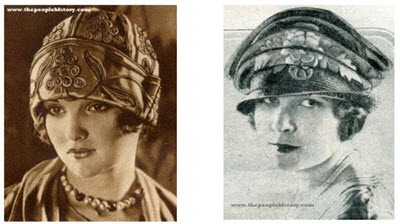
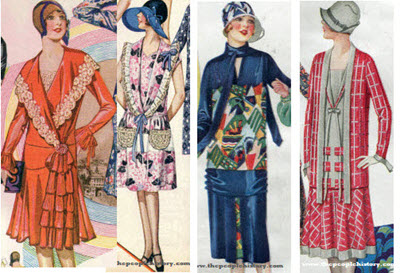
Part of our Collection of Childrens Clothes From the Decade
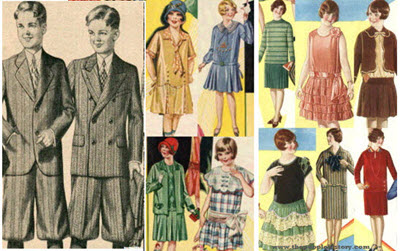
Childrens Toys From The 1920's
Part of our Collection of Toys from The 1920's
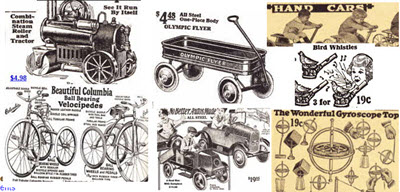
1920s Music
From our 20's Music Page
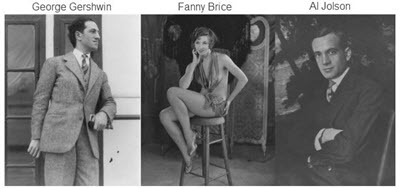
1895
Second Jungle Book , More famously known for Kim, Rudyard Kipling had written the stories of Mowgli in 1894 and 1895. It was in this year that the Second Jungle Book came out. The two books were commonly sold together as The Jungle Books. Mowgli had first appeared in 1893's In The Rukh, and is a fictional Indian character. Kipling is also known for his poetry: 'You're a better man than I am, Gunga Din....'
First Race Of Gas Powered Cars , Six motor cars left Chicago's Jackson Park for a 54 mile race to Evanston, Illinois and back on Thanksgiving Day 1895 racing for a 1st prize of $2,000 provided by the Chicago Times-Herald Newspaper. Car Number 5 driven by inventor Frank Duryea, won the race in just over 10 hours at an average speed of 7.3 mph.
Oscar Wilde , Playwright Oscar Wilde was found guilty of gross indecency in London and sentenced two years of hard labor. Playwright Oscar Wilde was arrested on charges of "gross indecency" under Section 11 of the Criminal Law Amendment Act earlier in April (in 1895) this term implied 'homosexual acts not amounting to buggery'.
First Slot Machines , Charles Fey a San Francisco Mechanic builds the First Slot Machines which he puts into local bars, the deal was simple Fey and the Bar Owner would split the profits 50-50.
The Radio or "Telegraphy without Wires" , Italian Born Inventor Guglielmo Marconi uses radio waves to create a system of "wireless telegraphy" to transmit signals a distance of approximately 1.5 kilometers in Pontecchio, Italy. He found no interest or backers and moved to England. Over the next few years having found financial backing he improved his equipment and in 1901 he sent a signal across the Atlantic from Poldu in Cornwall to St John's Newfoundland in Canada.
1896
Utah Becomes the 45th U.S. State , Utah becomes the 45th United State on January 4th , 1896. To become a state it became necessary to renounce the Mormon church's promotion of polygamy as well as their political party the "People's Party".
Yukon Gold Rush , Gold is discovered in Bonanza (Rabbit) Creek, Yukon, Canada starting the Klondike Gold Rush/Yukon gold rush. Thousands rush to the Klondike River near Dawson City, Yukon, Canada hoping to strike it rich.
First Modern Olympic Games , The Olympic Games of the I Olympiad are held in Athens, Greece. The original Olympics date back to 776 BC and were held at Olympia on the border of Greece and Macedonia and only Greeks were allowed to compete.
Dow Jones Industrial Average First Published , The Dow Jones Industrial Average was first published. The average price of the 12 initial stocks was 40.94.
General Electric The only company still in existence and trading under original name.
American Cotton Oil Company, now part of Unilever.
American Sugar Company, now Amstar Holdings.
American Tobacco Company, Broken Up.
Chicago Gas Company, now part of Integrys Energy Group, Inc.
Distilling & Cattle Feeding Company, now part of Lyondell Chemical Company.
Laclede Gas Light Company, still in operation as The Laclede Group.
National Lead Company, now NL Industries.
North American Company, Broken Up.
Tennessee Coal, part of U.S. Steel.
U.S. Leather Company, Gone.
United States Rubber Company, part of Michelin.
Tsar Nicholas II Nicholas II is crowned Tsar of Russia
1897
First US Gasoline Powered Car Maker , Charles Duryea and Frank Duryea were the first Americans to build a successful commercial automobile, and the first to incorporate an American business for the expressed purpose of building automobiles for sale to the public.
Grant's Tomb , The nation mourned with the death of Ulysses S. Grant in 1895, and thousands lined the streets of New York for the dedication of his tomb in 1897. It is on Riverside Drive and 122nd Street, and was attended by President McKinley. A number of Grant's ex-comrades and foes were also present.
Dracula Published , Bram Stoker's Dracula was published in this year, but owes its origins to some of the 19th Century's earlier literary works, such as Wilkie Collins' The woman in White and Moonstone, John Polidori's The Vampyre, and Dion Boucicault's The Vampire.
Boston Marathon , The World's oldest annual marathon run in Boston, Massachusetts, United States races for the first time. The Boston Marathon ranks as one of the world's most prestigious road racing events with an average of 20,000 taking part. The marathon is one of five members of the World Marathon Majors which include the cities of Boston, London, Berlin, Chicago and New York City.
1898
USS Maine , USS Maine suddenly explodes and sinks in Havana harbor, Cuba killing nearly three quarters of her crew. No cause has ever been found but suggested causes range from Spanish Espionage to an undetected fire in one of her coal bunkers.
New York's Five Counties , The counties (or boroughs) of New York City are defined. They are New York (Manhattan), King's (Brooklyn), Bronx (Bronx), Queen's (Queen's) and Richmond (Staten Island).
First Escalator Installed , Harrods in London installs a "Reno Inclined Escalator" to take its shoppers from the first level to the second level. Because it was considered to be an overpowering experience (It travelled at nearly 2 MPH) for the shopper, they placed a porter at the top of the Escalator to hand out tots of brandy for their shoppers.
US/Spanish War Declared , Spain declares war on the United States on April 23rd, 1898 after rejecting America's ultimatum to withdraw from Cuba.
US/Spanish War Battle Of Manila Bay , The American Asiatic Squadron under Commodore George Dewey engaged the Spanish Pacific Squadron under Admiral Patricio Montojo y Pasarón in Manila Bay, the Philippines and decimated the Spanish squadron. Rather than see the last of his ships destroyed or captured by the Americans, the Spanish Admiral Patricio Montojo y Pasarón ordered his crews to scuttle any Spanish Ships not destroyed. Although the American Fleet was much smaller than the Spanish Fleet, the Spanish Fleet consisted of mostly obsolete vessels.
US/Spanish War Puerto Rico , United States invades Spanish held Puerto Rico, meets little resistance and conquers the Island.
US/Spanish War Ends , Following defeats in Cuba and the Philippines, and both of its fleets incapacitated, Spain asks for peace On August 12 , 1898 and The United States gains almost all of Spain's colonies in the treaty, including the Philippines, Guam and Puerto Rico.
1899
Aspirin , Felix Hoffman, a German Chemist who worked for Bayer, investigated using a new acetylsalicylic acid as a less-irritating replacement for standard common salicylate medicines and together with other chemists created Aspirin for pain relief. Aspirin has been replaced by paracetamol and ibuprofen over recent years for pain relief but is widely used as a preventive treatment for heart attacks and strokes.
Philippine–American War , Following America gaining control of the Philippines as part of the ending of the Spanish-American War. The Philippines declared war against the United States requiring independence from America. The war continued until 1902 when the Philippine President Emilio Aguinaldo surrenders. In 1916 , the United States granted the Philippines autonomy and promised eventual self-government, which came in 1934. In 1946, following World War II, the Philippines would be granted full independence.
The Great Blizzard , 1899's Great Blizzard affected the South more than the North, and its reports gave it an extremely cold weight and density of air. It started on February 11th and despite its largely more southerly influence it reached -61º F in Montana and -47º F in Nebraska. Snow started falling on February 12th, and Washington D.C. had over twenty inches of snow falling, with New Jersey reaching an astonishing thirty-four inches. New Orleans was iced over, as were parts of the Mississippi River. By February 14th the temperatures started to rise again.
Second Boer War , The Second Boer War started on October 11th, and was a result of the Boer's unhappiness with Britain's reinforcement of its troops in South Africa, although its primary cause was more to do with Paul Kruger's refusal to give the non-Dutch inhabitants of the region their political rights and share of the country's means. The British High Commissioner had reacted badly to this and insisted on the British control or participation in the Transvaal's gold mines. The Boer armies attacked the still weak British forces in Natal and the Transvaal, and the northern parts of the Cape Colony had joined the Boers to besiege Ladysmith, Mafeking and Kimberley. The British, under Kitchener and Roberts, had defeated the larger parts of the Boer field army, but the war continued until 1902.